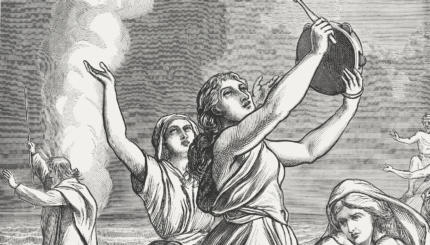We find ourselves living at an interesting time on a couple of levels. Having just participated in two wonderful Seders with my family commemorating the Exodus from Egypt we are getting ready for the last days of Passover commemorating our salvation at the Red Sea. Having just been liberated from slavery, our ancestors found themselves witness to the miracle of the Splitting of the Sea. One can only imagine the elation. In response to this, Moses and Miriam led the Israelites in the two songs sung at the sea. This has become the gold standard of expressing gratitude and religious freedom.
On this the Talmud Sanhedrin says:
The Holy One, blessed be God, does not rejoice in the downfall of the wicked. For Rabbi Shmuel ben Nahman said in Rabbi Yonatan’s name: What is meant by, “And one approached not the other all night”? (Exodus 14:20) In that hour [When the children of Israel crossed the Red Sea ] the ministering angels wished to utter the song of praise before the Holy One, blessed be God, but God rebuked them, saying: My handiwork [the Egyptians] is drowning in the sea; would you utter song before me! (Sanhedrin 39b)
The Egyptians slavers are finally getting their just due, yet God experienced no pleasure in the process. Why was the angels’ song censored, while the Israelites songs were not? A song of salvation is great, but rejoicing in someone else’s suffering is just wrong. Someone who truly cares for God’s honor would not rejoice when the wickedness of man gave God no choice but to blot it out. In the imagination of the Talmud from a divine perspective true freedom is only realized in a reconciliation process. It seems in light of their recent salvation the Israelite song might be explainable if not excusable. But the Talmud seems to pointing out that singing at this moment might be inappropriate.
Is the experience of happiness inherently contextual and only understood relative to others? What about our nature is so prone to take joy in others suffering as compared to our own happiness? While the freedom of religious expression is laudable and surely deserves praise and even song, why must it be coupled with reveling in the suffering of others let alone causing suffering?
These questions come to mind when thinking about Indiana’s Religious Freedom Restoration Act which allows any individual or corporation to cite its religious beliefs as a defense when sued by a private party. In the guise of providing people the ability to express their religious freedom it seems to give legal protections to discriminate against LGBT people. It is clear we still have a lot of work to do regarding civil rights for everyone in the country, but the last thing we need is to roll our laws back to the 1960’s. If you truly think people are acting against God, take comfort that God will deal with them. In the name of religion we should heed God’s call, enjoy our own salvation, and ensure that we do not cause any more tears. We are surely all God’s children. While they might be left with many questions after Passover, about this our children should have no doubts.
May we enjoy the time in our lives for joy– Moadim L’Simcha V’Shabbat Shalom
Talmud
Pronounced: TALL-mud, Origin: Hebrew, the set of teachings and commentaries on the Torah that form the basis for Jewish law. Comprised of the Mishnah and the Gemara, it contains the opinions of thousands of rabbis from different periods in Jewish history.


